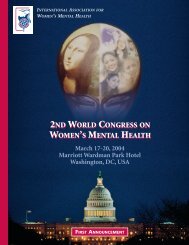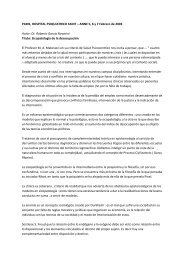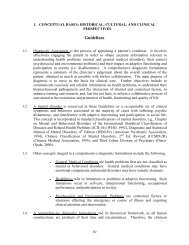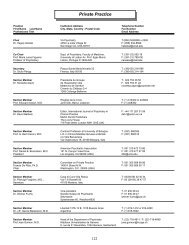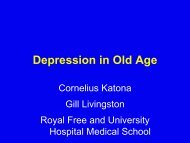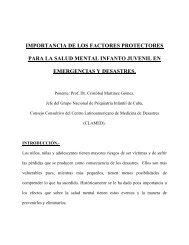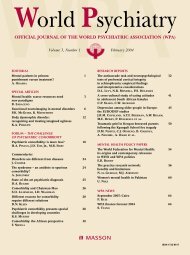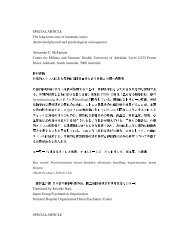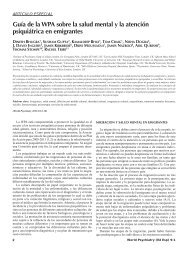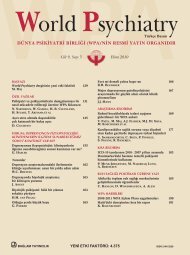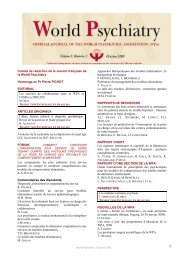ABSTRACTS - World Psychiatric Association
ABSTRACTS - World Psychiatric Association
ABSTRACTS - World Psychiatric Association
You also want an ePaper? Increase the reach of your titles
YUMPU automatically turns print PDFs into web optimized ePapers that Google loves.
one has to act. Governments have to allocate adequate resources, and<br />
support programmes and services. Empowered service users must<br />
assume an active role in advocacy, service planning and care delivery.<br />
Mental health professionals have to continue seeking the improvement<br />
of care by anchoring it on solid scientific, human rights driven evidence.<br />
Managers of services have to eliminate human rights’ abuses.<br />
Families, heads of communities, schools, labour, religious institutions<br />
must assume an active role in advocacy, care and rehabilitation. Parliamentarians<br />
have to promote the adoption and implementation of progressive<br />
legislation. Health insurers have to establish parity in care provision.<br />
The media have to help in the creation of a mental healthfriendly<br />
culture. The Global Forum for Community Mental Health<br />
brings together diverse constituencies with a real interest in better promoting<br />
mental health, preventing and treating mental disorders. Based<br />
on their different perspectives and bringing specific points of view from<br />
their own environments, these constituencies stimulate and lend support<br />
to action aimed at raising awareness in countries around the<br />
world on the burden of the mental and substance abuse problems, the<br />
community based interventions available to reduce them, and the pervasive<br />
effects of stigma and discrimination that affect persons with<br />
mental disorders and their families.<br />
US13.2.<br />
POWER IN NUMBERS: DEVELOPING<br />
PARTNERSHIPS FOR MENTAL HEALTH<br />
C. Underhill<br />
BasicNeeds, Warwickshire, UK<br />
For nearly a decade, BasicNeeds has been building partnerships at<br />
grassroots level with the goal of enabling poor people with mental<br />
disorders to live and work in their community. Across Africa, Asia<br />
and Latin America, we have trained 55 partner organisations to<br />
implement the Model for Mental Health and Development, enabling<br />
54,076 people with mental disorders to access services. We also enter<br />
into partnerships with our service users, whom we have supported to<br />
form over 200 self-help groups that, in some cases, are being structured<br />
into national movements. Based on this rich experience of local<br />
partnerships, we are building a knowledge base in support of international<br />
partnerships and networks, such as the Global Forum for Community<br />
Mental Health and the Movement for Global Mental Health.<br />
This paper gives examples of the process of partnership development<br />
and highlights benefits to working in partnership, namely: achieving<br />
service coverage in a context of resource gaps; making expedient<br />
progress in human rights at local and district levels; and mainstreaming<br />
people with mental disorders outside the field of health.<br />
US13.3.<br />
PARTNERSHIP OR PRETENSE:<br />
CAN PARTNERSHIPS BETWEEN USERS<br />
AND SERVICE PROVIDERS WORK<br />
M. Salie<br />
Cape Town, South Africa<br />
Janet Meagher, a long-time consumer organiser from Australia, wrote<br />
a book entitled “Partnership or Pretense”. This paper addresses the<br />
issue of partnerships between service providers and service user/survivor<br />
(hereafter referred to as user) groups in the light of this title. Is<br />
it possible to engage in partnerships if there remains inherent power<br />
inequalities between these two groups and what are the requirements<br />
for meaningful partnerships An attempt will be made to find<br />
answers to these questions. Also what needs to be discussed are an<br />
analysis of existing models of user/provider engagement and whether<br />
they are reflective of good or bad partnerships. There has also been<br />
confusion regarding family groups and user groups. Are these groups<br />
concerned with the same interests or do they in fact represent different<br />
concerns and where do they fit-in in the larger picture of<br />
user/provider interaction We argue for a strong and independent<br />
user movement and for engagement with providers and user groups<br />
on the basis of equality and respect for our human rights. Human<br />
rights abuse have been the idiosyncratic methodology of psychiatric<br />
institutions in the past and still continues in many places. However,<br />
harmful practices implicit in treatment modalities still continues even<br />
in this enlightened period. Therefore, partnerships in mental health<br />
can only truly be addressed if users, providers and family groups are<br />
on the same page regarding what constitutes respect for human rights.<br />
This is especially true in this present age in which the Convention on<br />
the Rights of Persons with Disabilities (CRPD) has become international<br />
law. The users, as persons with psychosocial disabilities, now<br />
have the protection of the CRPD and psychiatry has to start paying<br />
attention.<br />
US14.<br />
GENOMICS AND PROTEOMICS IN PSYCHIATRY:<br />
AN UPDATE<br />
US14.1.<br />
RETHINKING PSYCHOSIS<br />
N. Craddock<br />
Department of Psychological Medicine, School of Medicine,<br />
University of Cardiff, UK<br />
It has been conventional for psychiatric research, including the search<br />
for predisposing genes, to proceed under the assumption that schizophrenia<br />
and bipolar disorder are separate disease entities with different<br />
underlying etiologies. This represents the traditional dichotomous<br />
classification of the so-called ‘’functional’’ psychoses and forms the<br />
basis of modern psychiatric diagnostic practice. Recently, positive<br />
findings have been emerging in molecular genetic studies of psychoses.<br />
However, the pattern of findings shows increasing evidence<br />
for an overlap in genetic susceptibility across the traditional classification<br />
categories, including association findings at DISC1 and NRG1.<br />
Genome-wide association studies (GWAS) now provide greater<br />
power to explore the relationship between mood and psychotic illness.<br />
Within the context of the Wellcome Trust Case Control Consortium<br />
(WTCCC), we have studied 2700 mood-psychosis cases and<br />
3000 controls, and several other large-scale studies have been undertaken,<br />
including studies of structural genomic variation. The emerging<br />
evidence suggests the existence of relatively specific relationships<br />
between genotype and psychopathology. For example, in our dataset,<br />
variation at GABA A<br />
receptor genes is associated with susceptibility to<br />
a form of illness with mixed features of schizophrenia and bipolar disorder.<br />
Genome-wide significant associations at CACNA1C in bipolar<br />
disorder and ZNF804A in schizophrenia show evidence for a contribution<br />
to susceptibility across the traditional diagnostic boundaries.<br />
The elucidation of genotype-phenotype relationships is at an early<br />
stage, but current findings highlight the need to consider alternative<br />
approaches to classification and conceptualization for psychiatric<br />
research rather than continuing to rely heavily on the traditional<br />
dichotomy. As psychosis susceptibility genes are identified and characterized<br />
over the next few years, this will have a major impact on our<br />
understanding of disease pathophysiology and will lead to changes in<br />
classification and the clinical practice of psychiatry.<br />
17



